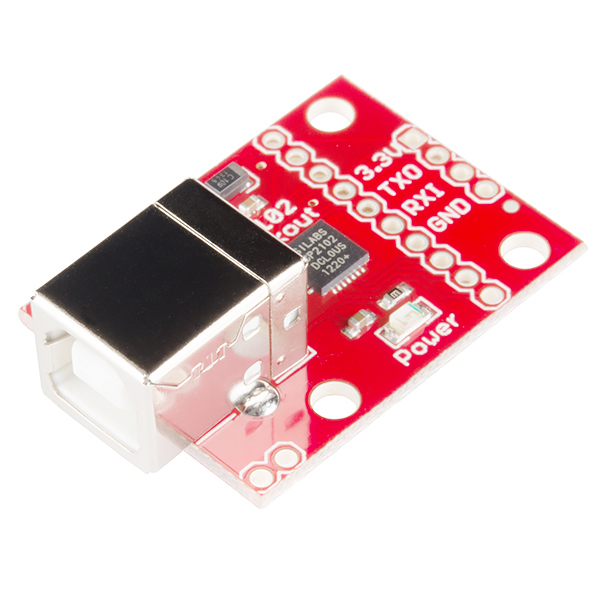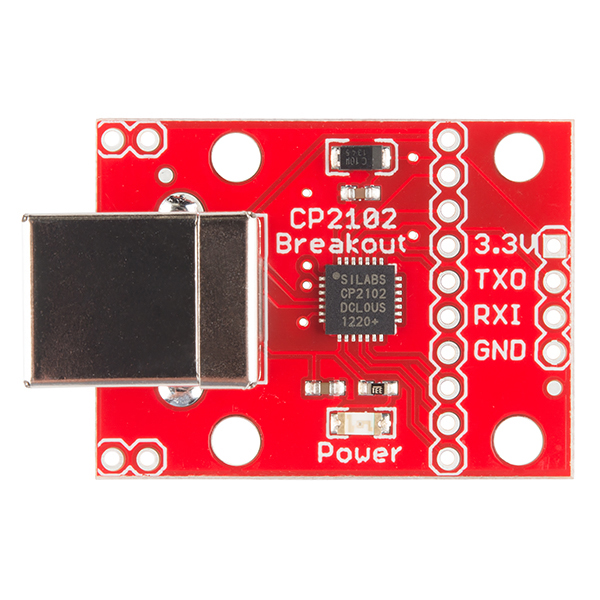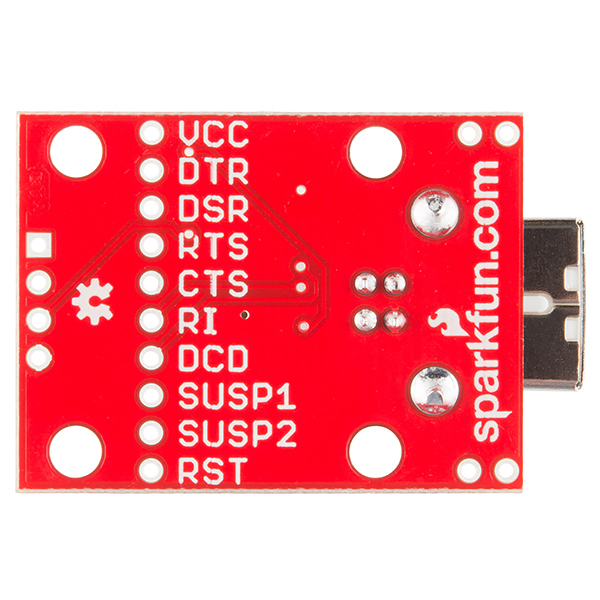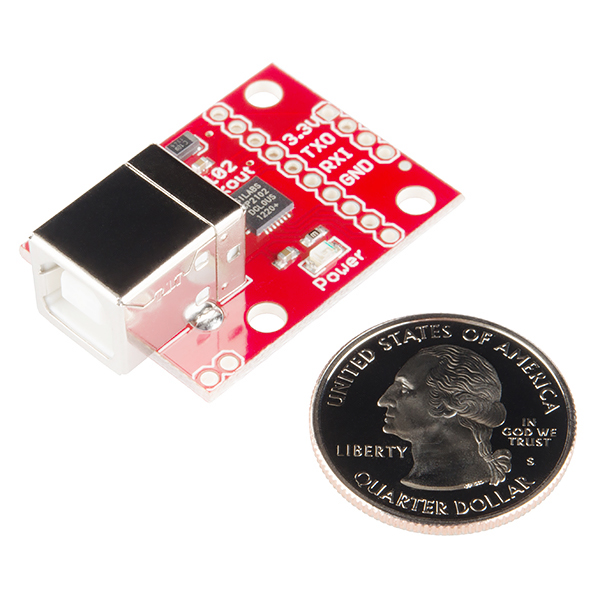SparkFun USB to Serial Breakout - CP2102
This is the CP2102 Breakout Board. This is a great little tool for embedded systems that require a serial connection to a computer. The board can simply attach to a USB bus via a standard type B female connector and will appear as a standard COM port.
Thes CP2102 doesn’t require any external oscillator, it has an on-board voltage regulator, and it even uses a reprogrammable internal EEPROM for the device description. The full hardware UART has flow control for baud rates from 300bps to 921600bps. This breakout also allows you to connect the TX/RX pins of your favorite microcontroller or serial application to the RX/TX pins of the breakout, creating a simple serial cable replacement.
- Implements full v2.0 USB protocol
- Needs no external crystal
- Internal EEPROM for device ID and Product Description strings
- Schematic
- Eagle Files
- Hookup Guide
- Datasheet (CP2102)
- Drivers
- GitHub
SparkFun USB to Serial Breakout - CP2102 Product Help and Resources
CP2102 USB to Serial Converter Hook-Up Guide
August 12, 2014
A basic hook-up guide for the CP2102 Breakout Board.
Core Skill: Soldering
This skill defines how difficult the soldering is on a particular product. It might be a couple simple solder joints, or require special reflow tools.
Skill Level: Noob - Some basic soldering is required, but it is limited to a just a few pins, basic through-hole soldering, and couple (if any) polarized components. A basic soldering iron is all you should need.
See all skill levels
Core Skill: Electrical Prototyping
If it requires power, you need to know how much, what all the pins do, and how to hook it up. You may need to reference datasheets, schematics, and know the ins and outs of electronics.
Skill Level: Rookie - You may be required to know a bit more about the component, such as orientation, or how to hook it up, in addition to power requirements. You will need to understand polarized components.
See all skill levels
Comments
Looking for answers to technical questions?
We welcome your comments and suggestions below. However, if you are looking for solutions to technical questions please see our Technical Assistance page.
Customer Reviews
No reviews yet.





The linked drivers did not work. These drivers worked for me: http://www.silabs.com/products/mcu/pages/usbtouartbridgevcpdrivers.aspx
The "SFE USB Drivers" link does not include drivers for linux and Mac. Can someone confirm these are the drivers for Mac and linux: http://www.silabs.com/Support%20Documents/Software/Mac_OSX_VCP_Driver.zip and http://www.silabs.com/Support%20Documents/Software/cp210x-3.1.0.tar.gz
Is there a current Sparkfun equivalent for this part?
We have several USB to Serial converters but none currently with the type B connector on them.
I think the SparkFun USB to Serial Breakout - FT232RL and SparkFun FT231X Breakout would be the closest thing(s). Both also breakout boards for USB to serial chips, just from a different vendor (FTDI instead of Silicon Labs). Be sure to read the full specs and such to make sure that they would be suitable replacements in your application.
Check this out! https://www.tindie.com/products/AtomSoft/breadboardbuddy-pro/
Very cool :) Thanks for sharing!
Why is this so expensive? The chip is $2 and the USB connector you have is slightly more than that. I'm not trying to hinder your sales, but I just purchased a similar device (with a standard USB connector) that already has soldered headers for $5. I just ordered some other equipment from here, but this was just too expensive for what it is.
ok something is confusing me. the data sheet for it says "Baud rates: 300 bps to 1 Mbits" and the data sheet also says "Baud Rates2 300, 600, 1200, 1800, 2400, 4000, 4800, 7200, 9600, 14400, 16000, 19200, 28800, 38400, 51200, 56000, 57600, 64000, 76800, 115200, 128000, 153600, 230400, 250000, 256000, 460800, 500000, 576000, 921600" in another.
so here is my question. can this thing do 1Mbps or is the fastest it can go 921600bps.
The fastest the chip can handle is 921600bps
I have an Arduino BT and might have software set the BT module to reset in my operating code could I use this to connect to the device and upload a new sketch to fix the problem?
Here is a question. I am chomping at the bit here to get started with a project with stuff from this site. I have a long history of software development on various platforms but I've never directly written against hardware before.
I have an old Amiga computer. Post-Commodore the big box Amigas had a route to USB. So there does exist a USB stack on the machine. My Amiga is not a big box device. I was thinking about trying to write something that would plug into the serial port (25pin) and allow this to be an incredibly slow USB port (but still allowing data transfer).
If I can do that, then I could look at the other hardware ports on the machine for something with faster access. Is this the totally wrong piece of hardware to try this with?
Greetings fellow Amiga fan! Unfortunately, this part probably isn't what you're looking for. USB ports come in two flavors: host mode (the PC side), or endpoint/slave (the peripheral side). This part is meant to be an endpoint; in other words, a host can talk TO it (creating a serial port), but to the best of my knowledge, it can't act as a host to allow it to talk to mice, keyboards, storage devices, etc.
If you're looking for a bit of a project, you might try working with an Arduino and the USB Host Shield to create a serial-to-USB-host bridge. The catch is that the Host Shield doesn't have universal support for every USB slave device - support needs to be programmed in for specific devices (but some work has already been done, check the link on the product page). Another option is to pipe the Amiga's serial through a PC, and have the PC do the USB - serial bridge work.
I agree that it's tough working with a machine that was frozen just before all of these interfaces came to be. When I was working the same problem, my best option was to get an Ethernet interface running, which allows file transfer back and forth. Good luck!
how do I install the drivers for MAC? Please help! thanks!
Could this be used for a microphone/speaker/ringer array for skype? If so, is there somewhere I can go to find out how?
Of course it could!
The amount of work however, to get what you described working, would probably be rather overkill. It sounds like you have a project in mind but don't understand what this does. There is very likely something available here that will suit your needs!
The community might be able to help you get started if we understood a little more about what you're trying to do.
Reliable and cheap! Perfect for quick and simple I/O for uC.